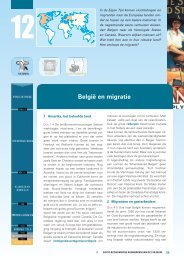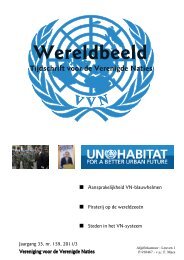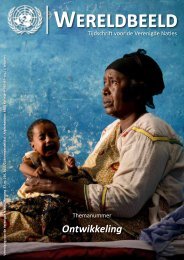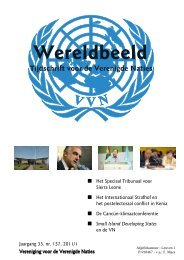Annex 5: United Nations Security Council Resolution 1874 (2009)
Annex 5: United Nations Security Council Resolution 1874 (2009)
Annex 5: United Nations Security Council Resolution 1874 (2009)
You also want an ePaper? Increase the reach of your titles
YUMPU automatically turns print PDFs into web optimized ePapers that Google loves.
In light of all these developments, it is decided that the UN <strong>Security</strong> <strong>Council</strong> (UNSC) will<br />
again convene to assess the current situation, and possibly to vote a new resolution.<br />
Together with your colleagues, you will have to come to a decision concerning the following<br />
questions;<br />
1. Which elements within the previous UN <strong>Security</strong> <strong>Council</strong> <strong>Resolution</strong> <strong>1874</strong> (<strong>2009</strong>) should<br />
be adapted to the current situation? Should certain provisions be strengthened, or do the<br />
council members think that too severe restrictions are ‘backfiring’ – in which case the<br />
provisions as written in UNSC <strong>1874</strong> should be softened.<br />
2. In light of recent developments, should certain ‘incentives’ or ‘penalties’ be imposed on<br />
North Korea? If yes, what kind of incentives/penalties & what kind of time-framework<br />
should be envisioned?<br />
3. Should the international community develop a framework so as to re-start the “Six Party<br />
Talks”? If so, how can this be accomplished in light of recent DPRK-statements that North<br />
Korea will not resume the Six Party Talks?<br />
4. What additional measures can be taken by the UNSC to de-escalate the current dangerous<br />
situation on the ground, and on the high seas?<br />
5. What preventive measures can be taken so as to limit potential proliferation by North Korea<br />
and also to assure all powers in the region that an arms race is not a viable option for the<br />
peace and security of the region, and the world.<br />
The <strong>United</strong> <strong>Nations</strong> <strong>Security</strong> <strong>Council</strong> will<br />
convene in an Emergency Meeting in<br />
Brussels in an attempt to develop a<br />
common answer from the international<br />
community to this volatile crisis. A<br />
Plenary Session will give each of the<br />
member-countries of the UN <strong>Security</strong><br />
<strong>Council</strong> an opportunity to influence the<br />
course of current international politics.<br />
Some other countries will also be invited<br />
by the 15 to have a say, although they<br />
will themselves not be deciding parties.<br />
You will act as the Ambassador of one of the 15, or of an invited delegation. Be aware,<br />
however, that negotiations constitute a dynamic process; it will be up to you to defend the<br />
interests of your country/delegation! You and only you will also be answerable for your<br />
actions to your own Government upon returning to your capital.<br />
Thus, much is at stake… It will therefore prove crucial that you reflect in advance about the<br />
strategy you will follow during the deliberations. For this purpose, you will be asked to<br />
write a position paper in preparation of the Emergency Meeting. The position papers will be<br />
officially distributed in advance. The strategy papers however should be considered top<br />
secret material which can only circulate within and not between delegations.<br />
© <strong>2009</strong> – Dr. D. Criekemans – Negotiations in UNSC on the continuing security provocations by North Korea 30







